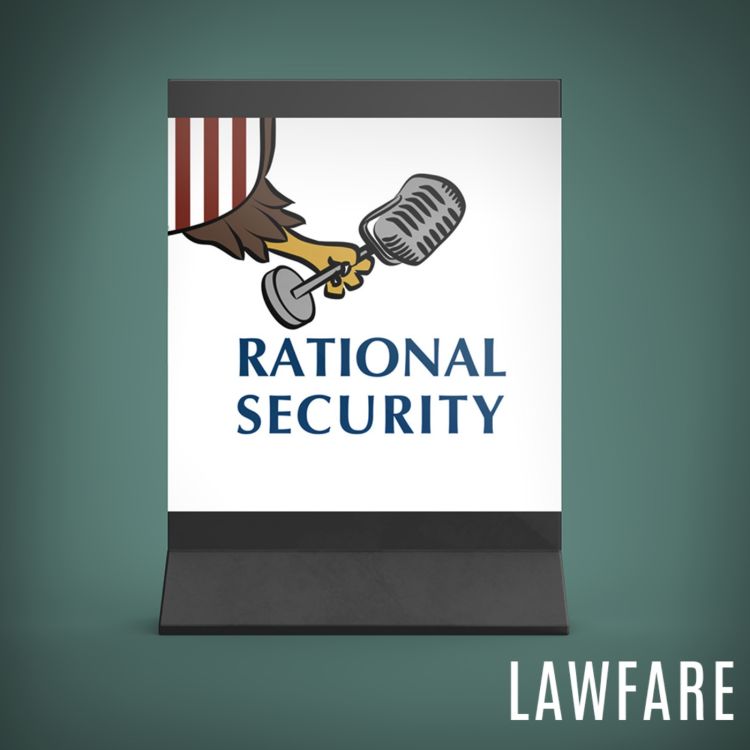Share

The Lawfare Podcast: Patreon Edition
Rational Security: The “Exit, Pursued by a Bear Cub” Edition
•
This week, Alan, Quinta, and Scott were joined by co-host emeritus Benjamin Wittes to talk through the week's very big national security news stories, including:
- “The Waiting Game.” The Middle East is on edge this week as it awaits a possible attack by Iran or Hezbollah on Israel in response to the suspected assassination of senior Hezbollah and Hamas leaders last week, including the chairman of Hamas’s political bureau, Ismail Haniyeh, who was killed while visiting Tehran for the swearing in of its new president, Masoud Pezeshkian. What might a response look like, if there is one? And what does it mean for the region, including the prospects of a Gaza ceasefire?
- “Stay Weird, Austin.” Just days after the announcement of a long-negotiated plea deal for three of the four remaining defendants in the military commission trial relating to the 9/11 attacks, Secretary of Defense Lloyd Austin took the surprising and still largely unexplained move of intervening to rescind that deal and remove the convening authority that had approved it. What can explain Austin’s actions? What will they mean for the future of the military commissions?
- “A Favorable Exchange Rate.” In a surprise move, the Biden administration and several European allies concluded a massive prisoner exchange with Russia, which resulted in the release of 16 detained U.S. and European nationals and Russian dissidents, among them Wall Street Journal reporter Evan Gershkovich and former U.S. Marine Paul Whelan. In exchange, Russia received eight Russian agents, including convicted assassin Vadim Krasikov. Is this a win for the Biden administration? What does it tell us about the state of hostage politics—and its future?
For object lessons, Alan expressed his new passion for pottery. Quinta endorsed synchronized/artistic swimming as her favorite Olympic event, thanks in part to a surprise cameo from Jason Momoa. Scott recommended the movie Thelma for a funny and compassionate take on aging. And Ben shared how a recent near-death experience led him to dump chalk dust outside the Russian Embassy.
More episodes
View all episodes

Lawfare Daily: Securing Open Source Software, with John Speed Meyers and Paul Gibert
47:48|Lawfare Fellow in Technology Policy and Law Eugenia Lostri sits down with John Speed Meyers, head of Chainguard Labs, and Paul Gibert, a research scientist at Chainguard Labs to talk about the distinct challenges of securing open source software (OSS). They discuss what sorts of harms OSS compromises can lead to, how Log4J opened a political window for action on OSS security, and how the software liability debate affects OSS developers.Meyers and Gibert authored a Lawfare article questioning the conventional wisdom on how software liability could deal with OSS.
Lawfare Archive: Foreign Interference... It's Happening
43:06|From October 23, 2020: It's been a wild couple of days of disinformation in the electoral context. Intelligence community officials are warning about Russian and Iranian efforts to influence the U.S. presidential election—and claiming that Iran is responsible for sending threatening emails from fake Proud Boys to Democratic voters. What exactly is going on here? To talk through the developments and the questions that linger, Benjamin Wittes sat down with Scott R. Anderson, Susan Hennessey and Quinta Jurecic.
Lawfare Daily: Trump Trials and Tribulations Weekly Round-up (September 5, 2024)
01:29:35|This episode of “Trump's Trials and Tribulations,” was recorded on September 5 in front of a live audience on YouTube and Zoom.Lawfare Editor-in-Chief Benjamin Wittes spoke to Lawfare Senior Editors Anna Bower and Roger Parloff Thursday’s hearing in the D.C. case, Judge Chutkan’s scheduling order on the briefing on the immunity issue, Trump’s efforts to remove his New York hush money and election interference case to federal court, and an interesting amicus brief in the classified documents case.Learn more about Lawfare’s new livestream series about the national security issues under debate during the 2024 presidential election.
Lawfare Daily: Catching Up on the State of Platform Governance: Zuckerberg, Durov, and Musk
49:20|It’s been a busy week in the world of social media and technology platforms. Meta CEO Mark Zuckerberg sent an odd letter to the House Judiciary Committee apparently disclaiming some of his company’s past content moderation efforts. Telegram founder Pavel Durov was arrested in France on a wide range of charges involving an investigation into the misuse of his platform. And Elon Musk is engaged in an ongoing battle with Brazilian courts, which have banned access to Twitter (now X) in the country after Musk refused to abide by court orders. These three news stories speak to a common theme: the difficult and uncertain relationship between tech platforms and the governments that regulate them. To make sense of it all, Quinta Jurecic, a Senior Editor at Lawfare, with Matt Perault—the Director of the Center on Technology Policy at the University of North Carolina at Chapel Hill—and Renée DiResta, author of the new book, “Invisible Rulers: The People Who Turn Lies Into Reality,” and the former technical research manager at the Stanford Internet Observatory.
Rational Security: The "Third Anniversary Hot Take Takedown: Comeuppance" Edition
01:10:56|This week, Alan, Quinta, and Scott celebrated the third anniversary of Rational Security 2.0 with their Lawfare colleagues Molly Reynolds, Natalie Orpett, and Tyler McBrien, who sat in brutal judgment as the three co-hosts pitched them their hottest takes yet, including:Are concerns about judicial ethics overblown?Do ethics require that we open the borders and make whoever wants to become one a citizen?Should we just treat AI systems like the wild animals they are?Which takes are undercooked, which too hot, and which are just right? Listen in and decide!Meanwhile, for object lessons, Scott shared some news about the future of Rational Security moving forward. Listen to the end of the episode to find out what!
Lawfare Daily: In Search of a Harris Doctrine with Michael Hirsh
38:01|As Robbie Gramer and Amy Mackinnon wrote in Foreign Policy, “If you want to learn more about the U.S. Democratic Party’s foreign-policy vision as the Democratic National Convention (DNC) gets underway this week, you have two options: a webpage that apparently hasn’t been updated in three years or a massive PDF document that is still written as if President Joe Biden, not Vice President Kamala Harris, is the party’s candidate.”In other words, figuring out what a potential Harris administration foreign policy or Harris Doctrine might look like is no small task. On today’s episode, Lawfare Managing Editor Tyler McBrien sat down with Foreign Policy Columnist Michael Hirsh to try to do just that. They discussed “Preparing for a Less Arrogant America,” Hirsh’s review of the most recent books by Vice President Harris’s top foreign policy advisors, Philip Gordon and Rebecca Lissner, as well as other clues about the shape of a potential Harris administration foreign policy agenda.
Lawfare Daily: Duncan McLaren on the Opportunity Costs of Geoengineering
40:26|Duncan McLaren, Climate Intervention Fellow in Environmental Law and Policy at UCLA, joins Kevin Frazier, a Tarbell Fellow at Lawfare, to discuss geoengineering in light of a recent New York Times article detailing prior efforts to conduct climate interventions, namely the SCoPEx project. This conversation explores the history of geoengineering, different geoengineering techniques, and the opportunity costs associated with further research in the field.
Chatter: How Movies and TV Affect Everything, with Walt Hickey
01:31:17|Walt Hickey is the Deputy Editor for Data and Analysis at Insider News, and the author of You Are What You Watch: How Movies and TV Affect Everything. His book explores the power of entertainment to change our beliefs, how we see ourselves, and how nations gain power.He joined Eugenia Lostri, Lawfare's Fellow in Technology Policy and Law, to talk about how we use media to express our societal apprehensions, the ways in which the military, NASA and the CIA collaborate with Hollywood, and the soft power of media productions.Chatter is a production of Lawfare and Goat Rodeo. This episode was produced and edited by Isabelle Kerby-McGowan and Cara Shillenn of Goat Rodeo. Podcast theme by David Priess, featuring music created using Groovepad.
Lawfare Daily: Kevin Frazier on Prioritizing AI Research
32:54|Associate Professor at the University of Minnesota Law School and Lawfare Senior Editor Alan Rozenshtein sits down with Kevin Frazier, Assistant Professor of Law at St. Thomas University College of Law, Co-Director of the Center for Law and AI Risk, and a Tarbell Fellow at Lawfare. They discuss a new paper that Kevin has published as part of Lawfare’s ongoing Digital Social Contract paper series titled “Prioritizing International AI Research, Not Regulations.”Frazier sheds light on the current state of AI regulation, noting that it's still in its early stages and is often under-theorized and under-enforced. He underscores the need for more targeted research to better understand the specific risks associated with AI models. Drawing parallels to risk research in the automobile industry, Frazier also explores the potential role of international institutions in consolidating expertise and establishing legitimacy in AI risk research and regulation.